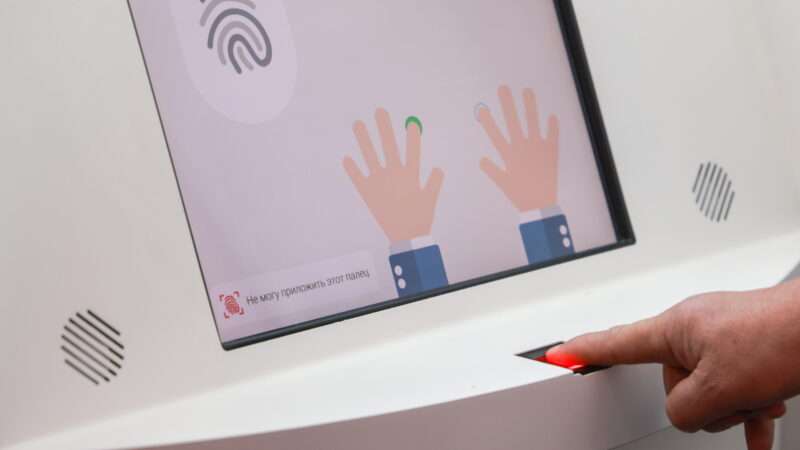
Once upon a time, citizens of the United States could travel to almost every country in the European Union for 90 days without asking any government for permission beyond showing a passport at the initial point of entry. It was—and still is, for a few waning months—a marvelous if underacknowledged achievement for liberty.
Alas, the days of frictionless travel will soon be a memory. Starting at a so-far-unspecified date in early 2024, Americans and residents of 62 other countries that currently enjoy visa-free visitation to the Schengen Area of the E.U. will need to pay a fee and submit an online application (including biometric information, work experience, medical conditions, and initial itinerary), then pass a criminal/security background check, before enjoying that croissant in gay Paree. The grimly named European Travel Information and Authorisation System (ETIAS) is projected to cost 7 euros per application and take up to 14 days to render a decision.
Before you start shaking your fist at freedom-hating Eurocrats, know that ETIAS is the belated continental answer to a system the U.S. has imposed on residents of friendly countries since 2009, called the Electronic System for Travel Authorization, or ESTA. Like ETIAS, ESTA is a response to 21st-century terrorist attacks and combines modest fees ($21) with less-than-instantaneous turnaround times (a promised 72 hours). Both either tweak or torpedo (depending on your point of view) the notion of reciprocal "visa waiver" travel between high-trust countries.
U.S. passports have long been given the red carpet treatment worldwide, due to the country's economic heft and traditional leadership role in negotiating down international barriers to the movement of people (and goods). That latter ethic began to deteriorate after the Cold War, with the rise of bipartisan anti-illegal immigration politics in the early 1990s, and then in earnest after Saudi nationals pulverized the World Trade Center with highjacked planes on September 11, 2001.
The Implementing Recommendations of the 9/11 Commission Act of 2007 mandated that travelers from Visa Waiver countries (which now number 40) submit an application using a machine-readable passport, volunteer plenty of personal information, and answer correctly a series of potentially disqualifying questions. As some of us mentioned at the time, "Whatever we impose on the world, the world will get around to imposing on us."
We have since imposed still more restrictions, which many Europeans are discovering this summer to their chagrin. First was the 2015 exclusion (backed by several libertarian-leaning legislators) of dual nationals of both an existing Visa Waiver country and of either Iran, Iraq, Sudan, or Syria, as well as anyone (aside from those in selected professions) who had visited any of those countries since 2011. Then in 2016, the Department of Homeland Security (DHS) added Libya, Somalia, and Yemen to the list.
Having been thus teed up by the administration of Barack Obama, President Donald Trump in his first days in office singled out those exact seven countries for a travel and refugee ban. And he was not done. All it takes is an official (if political and arbitrary) U.S. government designation of being a state sponsor of terrorism for a country to be declared retroactively off-limits for prospective visa-free visitors to America.
So, beginning in 2019, citizens of Visa Waiver countries who had visited North Korea since 2011 were no longer eligible for Visa Waiver treatment. Then in August 2022 (based on a late Trump administration decision), Cuba was added to the don't-go-there list retroactive to 2021; the ESTA application system was updated with a Cuba-travel question just this month.
What to Europeans seemed like a routine questionnaire administered mostly by airline companies has now produced the shocking outcome that they have to spend $160 and wait many, many months to maybe (or maybe not!) obtain permission to travel into the United States. More than 300,000 Europeans from Spain, Germany, the United Kingdom, France, Italy, and Portugal alone visited Cuba in 2022, according to the Cuban government.
So, because of 9/11, and the 2014 terrorist attacks worldwide, and the partisan seesawing of policy toward communist Cuba, peaceful Europeans who want to spend money in the United States are being thwarted in the name of fighting terrorism. It is a foolish policy that will definitely make America poorer while having a marginal (if any) impact on safety.
Could the E.U. retaliate in some way, exempting more U.S. passport holders from the already modified Visa Waiver system? On the one hand, visa policies are definitionally reciprocal; on the other, Washington has more heft and can move with much more bureaucratic speed than Brussels. The most likely targets for any future retribution would be Americans holding dual citizenship in disfavored countries, or perhaps even those who have traveled to countries that Eurocrats have deemed beyond the pale. Always remember that it happened here first.
Governments love having humans maximally searchable on databases, using digitized identification. For a long time, it was cranky Americans, with their stubborn notions of privacy and liberty—the right to move through life without showing papers to people with guns—who led the resistance against being answerable, of having to ask officials for permission. Now it's us pushing the rest of the "free world" toward having global biometric and banking information just a single government click away. Shame, that.
The post Say Goodbye to Permissionless Travel appeared first on Reason.com.







